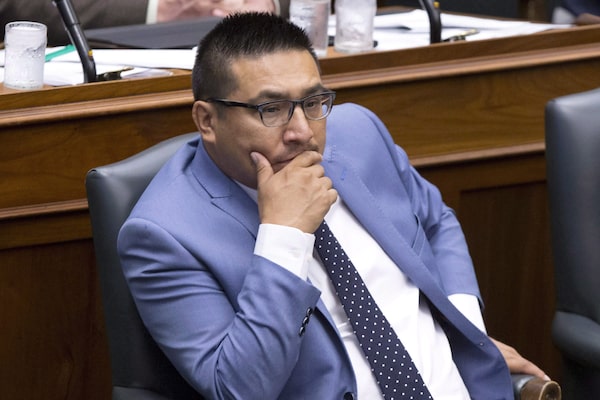
Sol Mamakwa, NDP MPP for Kiiwetinoong, attends Question Period at the Ontario Legislature in Toronto on July 31, 2018.Chris Young/The Canadian Press
Ontario Premier Doug Ford has privately apologized to Indigenous MPP Sol Mamakwa for accusing him of COVID-19 vaccine queue-jumping, but the Premier is being urged to make his statement publicly to First Nations people.
The mea culpa came a day after the Premier claimed, without evidence, in Question Period that Mr. Mamakwa was “jumping the line” by travelling to two remote communities to receive shots. Mr. Mamakwa, a New Democrat, is the only member of the Legislature who hails from a First Nation, and he and Indigenous leaders said he was invited to the communities to combat coronavirus vaccine hesitancy.
Mr. Ford’s comments were widely condemned by all three opposition parties at Queen’s Park and Indigenous leaders, including Assembly of First Nations National Chief Perry Bellegarde, who called the remarks “unacceptable.”
Although the Premier’s Office said earlier Friday that he was not expected to make any statements, Mr. Mamakwa said Mr. Ford phoned him late in the afternoon to apologize “for attacking me personally.” He said he appreciated the call – with the Premier also inviting the MPP to his office at a later date – but more is needed.
“For him to personally attack me is an attack on Indigenous people and he needs to publicly apologize for that,” Mr. Mamakwa told reporters at Queen’s Park.
Mr. Mamakwa said the Premier’s comments questioning whether he was eligible for the vaccine as a First Nations person amounted to colonialism, racism and oppression. “When you are trying to save lives, literally, in First Nations communities, that wasn’t a fair comment,” he said.
In a brief statement issued before Mr. Mamakwa spoke, Mr. Ford’s director of media relations, Ivana Yelich, said, “Earlier today, Premier Ford called MPP Mamakwa for a private conversation to apologize for his comments during Question Period yesterday.”
The Ontario government has prioritized First Nations communities in its vaccine rollout campaign. It launched Operation Remote Immunity on Feb. 1, the same day Mr. Mamakwa received his first vaccine dose, in Muskrat Dam First Nation.
The program, led by Ontario’s Ornge air-ambulance service and in co-operation with groups such as Nishnawbe Aski Nation, has delivered first doses in 31 fly-in First Nations communities and Moosonee in Northern Ontario. As of March 11, 17,611 doses (13,428 first doses and 4,183 second doses) of the COVID-19 vaccine had been administered.
The rollout in the remote north has been touted successful by those involved. The Weeneebayko Area Health Authority said 4,300 members in its six communities were vaccinated in Operation Remote Immunity, and most have already received both doses. Lynne Innes, president and chief executive officer of WAHA, said uptake was at least 70 per cent in the communities, and 94 per cent in one.
Nishnawbe Aski Nation Grand Chief Alvin Fiddler called Mr. Ford’s comments a huge distraction to next steps in the vaccine rollout as it continues for urban Indigenous populations, now that Operation Remote Immunity is gearing down.
Mr. Fiddler said he’s confident in the model developed through partnerships for the massive rollout. He called it a true collaboration with Ornge, the province, the federal government, health authorities and local communities, based on respect and a common goal.
“We want to ensure that momentum carries us into vaccinating our road access communities and also the urban population, our members and families that live in urban centres,” Mr. Fiddler said.
Joshua McNamara, a spokesman for Ornge, said vaccine hesitancy has been a concern during Operation Remote Immunity. “Throughout the campaign, many leaders, elders and respected community members have led by example and championed the vaccine as an essential tool against COVID-19. These measures have been instrumental in the successes to date,” he said.
Our Morning Update and Evening Update newsletters are written by Globe editors, giving you a concise summary of the day’s most important headlines. Sign up today.